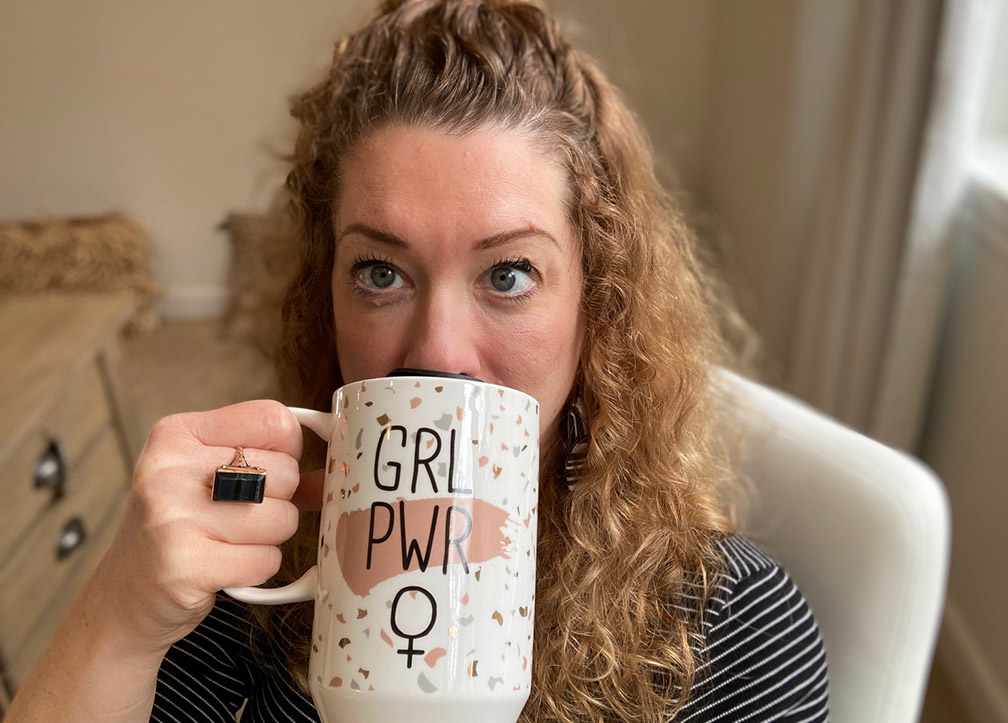
15 of the best perimenopause supplements, vitamins, drugs, hormones, and foods
I’ve read dozens of guides about the remedies and supplements you can take when you’re in perimenopause. And like fellow perimenopausal women, I’ve spent many nights Googling queries like “why do I wake up in the middle of the night?” and “what’s the deal with night sweats?” Dr. Google aside, I’ve experienced my fair share of hopelessness after seeing *real* doctors who say, “just buck up and deal”.
Thankfully, now that I’m two years into my perimenopause journey and feel like an old peri pro, I’ve found sympathetic doctors, progressive remote health services, and supportive women’s communities that totally get it. Yes, perimenopause is making progress in the women’s health world — finally, a few corners of the world are paying attention and want to do something about it.
That said, there’s a long road ahead for the general medical community to understand perimenopause and its effects on women’s health and wellness — and doctors are owning up to it. “There is a huge gap in terms of both provider and patient education about perimenopause and menopause,” says Dr. Stephanie S. Faubion, in The New York Times. Dr. Faubion is medical director for the North American Menopause Society.
What are common perimenopause symptoms?
I experience the bulk of the “most popular” perimenopause symptoms, including fatigue, night sweats, water retention, worse PMS and premenstrual headaches, and occasional brain fog.
Here are other common perimenopause symptoms, according to most medical references like The Mayo Clinic:
- Irregular period
- Hot flashes and sleep problems
- Mood changes
- Forgetfulness
- Vaginal dryness
- Bladder problems
- Decreasing fertility
- Loss of bone density
- Changing cholesterol levels
My midlife health goals?
To maximize energy, stay happy and positive-minded, and generally feel good during this demanding and exciting time of life — you know, kids, career, dreams and goals, great husband, etc. I also want to keep my metabolism going and get as much quality sleep as possible. Thankfully, I’ve found the right combination of supplements, vitamins, and hormone replacement therapy that works well for me.
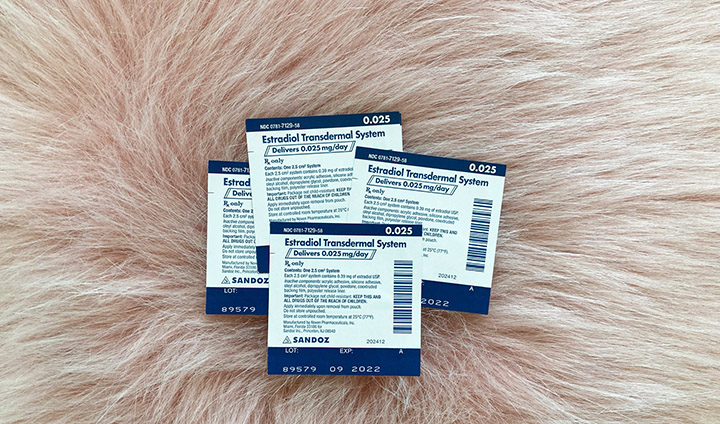
Twice a week: the Estradiol patch
On Mondays and Fridays, I apply a small estrogen sticker to my hip — the product is called Estradiol Transdermal System. My hormone specialist prescribed it to me as part of my hormone replacement therapy (HRT).
Does Estradiol work? Definitely. In fact, by Thursday, when my system is running low on estrogen, I start counting down to when I can apply the patch. I started with a low dosage of Estradiol, 0.025 mg/day, and because I’ve continued to have excruciating headaches before my period, my doctor recently increased my dosage to 0.050 mg/day.
Are there risks with taking hormone replacement therapy?
Yes, and you must talk with your doctor before starting HRT. The Mayo Clinic says that in addition to treating common menopausal symptoms like hot flashes and vaginal discomfort, hormone therapy has been proved to prevent bone loss and reduce fracture in postmenopausal women.
“However, there are risks associated with using hormone therapy,” such as stroke, blood clots, and breast cancer, the Mayo Clinic reports. “These risks depend on the type of hormone therapy, the dose, how long the medication is taken and your individual health risks. For best results, hormone therapy should be tailored to each person and reevaluated every so often to be sure the benefits still outweigh the risks.”
Morning regimen
Full transparency, I take an antidepressant (Fluoxetine) for, well, my tendencies toward depression, but it also apparently helps prevent hot flashes, and I can say with certainty that that’s the case for me. I’ve never had a hot flash.
An antidepressant also can help reduce night sweats, and I’m prone to the sweat-through-your-sheets variety. My doctor recently increased the dosage of my antidepressant and already I’m experiencing less sweating.
Black cohosh for PMS and cramps
Black cohosh is commonly used for symptoms of menopause, premenstrual syndrome (PMS), painful menstruation, and osteoporosis. As WebMD explains, “Black cohosh root also seems to have some effects similar to the female hormone, estrogen. In some parts of the body, black cohosh might increase the effects of estrogen. In other parts of the body, black cohosh might decrease the effects of estrogen. Black cohosh shouldn’t be thought of as an ‘herbal estrogen’ or a substitute for estrogen. It’s more accurate to think of it as an herb that acts similarly to estrogen in some people.”
Chasteberry for PMS and breast tenderness
Vitex aka chasteberry is used to treat infertility and for relief of premenstrual syndrome symptoms. As Memorial Sloane Kettering Cancer Center writes, studies have shown that chasteberry contains hormonal precursors that can prompt hormone changes within the body by activating those receptors. Various studies have found chasteberry to be effective in reducing breast pain and other PMS symptoms, but not for symptoms of menopause.
FYI, the recommendation is to take one capsule two or three times a day for eight to 12 weeks to allow for building up in your system. Thereafter, you can take one capsule per day.
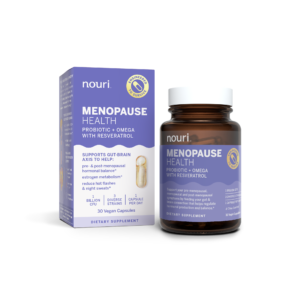
Nouri Menopause Health Probiotic for hormone balance
These capsules combine “plant-based omega oil, resveratrol, and precision probiotic strains clinically proven to support healthy estrogen metabolism, hormonal balance, and microbiome diversity.” Essentially, Nouri’s select combo of probiotics activates the microbes in your digestive tract to tell your brain to tell your hormones to chill the F out. Read Beauty Director, Lauria Locsmondy’s review here”
Vitamin D for boosting energy and vitality
Vitamin D is just as important as calcium for bone health. Without vitamin D, your body can’t absorb calcium. Most adults need 600 IU daily. Vitamin D is in many foods and supplements, but there’s another source: the sun, which is great so long as you wear sunscreen.
Vitamin B to soothe stress and irritability
I’ve taken Vitamin B in various formats for several years and recently started taking this particular variation with Vitamin C because it helps reduce stress.
So. Much. Water. Because hydration.
I know, call me crazy because I have to pee like every 45 minutes, but I work from home!
Half-caff coffee with stevia and almond milk for energy and focus
I’ll be honest: I drink coffee pretty much all day, and as much as I enjoy full-strength coffee, I rarely drink it at home because it makes me jittery. Coffee with half the caffeine helps me stay alert and focused without the jitters. Almond milk is a great way to save calories to boot.
I drink Folgers 1/2 Caff Half Caffeinated Medium Roast Ground Coffee, 25.4 Ounces. Seriously, the cheap stuff is cool with me, plus it frees up more budget for stevia, which ain’t cheap. I stir in stevia because it tastes almost as good as sugar and it comes from a plant! I buy stevia in bulk — it’s great for baking, too.
I also like Green Mountain Coffee Roasters Half Caff, Single-Serve Keurig K-Cup Pods.
After dinner — my wind-down-and-get-creative time
I love juicy red wine, but I’ve cut waaaaay back in recent years because it just makes me so damn sleepy. I used to drink red wine several nights a week, but nowadays I probably enjoy it only a handful of times per month. Which is fine, because I think I’ve lost a couple of pounds and saved money in the process and I get more done. Enter: cannabis.
THC edibles for relaxation and creativity
Now that I’m a grown-ass lady and I do what I want, I enjoy a hybrid gummy every now and then. Usually on a Friday or Saturday night, I’ll take a quarter or a third of a gummy with 10mg THC .
Dark chocolate for heart health
In my 20s, I smoked cigarettes, which I’m grateful to say disgust me now. In my 40s, I’ve developed a sweet tooth, so when I learned that dark chocolate is full of antioxidants and promotes heart health (when eaten in moderation), I signed myself up.
Dietitian Sarah Mirkin, R.D.N., author of Fill Your Plate, Lose the Weight: a 21-day weight loss plan for women over 40, includes dark chocolate on her list of the 30 healthiest foods for women over 40. “Dark chocolate is rich in flavonols, which protect your heart, reduce the risk of diabetes, and lower blood pressure,” Mirkin says in Prevention.
I keep it real (and affordable) with dark chocolate chips. My favorite is classic Tollhouse dark chocolate, but I try to steer myself toward chips with a high percentage of cacao — ideally, more than 70%. FYI, dark chocolate contains about 5–20 milligrams of caffeine per ounce — more than milk chocolate — so don’t eat it too close to bedtime if you can help it.
Bedtime regimen
Progesterone to reduce night sweats and hot flashes
You probably know progesterone as the “pregnancy hormone.” During our baby-making years, progesterone influences the preparation of the uterus for possible pregnancy. On the flip side, progesterone also affects other body functions, so when the ovaries don’t make as much progesterone, you may experience migraine headaches, mood changes, and irregular bleeding.
I currently take 100 mg, a relatively low dosage of progesterone, nightly as part of my HRT regimen. In fact, my doctor started me on progesterone before she prescribed me with the Estrogen patch. Healthline reports that taking 300 milligrams of progesterone daily at bedtime improved the quality of deep sleep.
Melatonin to wind down your mind
Sleeping has long been my favorite hobby, but as you know probably as well as I do, sleeping while perimenopausal is a pain in the butt. What with all the waking up in the middle of the night to pee and stare at the ceiling. Melatonin and non habit-forming sleeping aids can help with insomnia.
Fiber gummies for digestion and weight management
As a longtime fan of gummy candy, this is a welcome treat before bedtime — I usually take the sugar-free or low-sugar variety. A coupla fiber supplements keep things moving and grooving.
Why is fiber important? Fiber helps keep cholesterol in check, keep our hearts healthier, and manage blood sugar levels. According to Harvard Health, eating enough fiber from veggies, fruits, and whole grains can decrease your risk of dying from heart disease, stroke, type 2 diabetes, and colon cancer. And the more fiber you consume, the more benefits you get.
Unfortunately, despite the fact that fiber is in many foods, the vast majority of American women do not get enough of the USDA recommended daily intake. Women should get 25 grams a day; after age 50, it’s 21grams, but studies show that most people consume a max of 10 to 15 grams a day.
Sorry, the comment form is closed at this time.

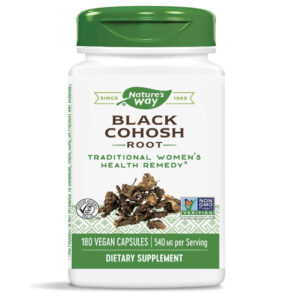
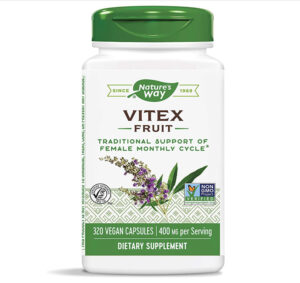
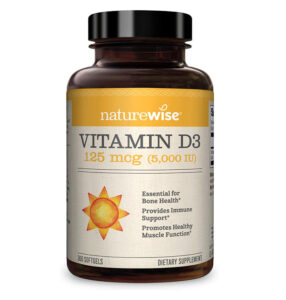
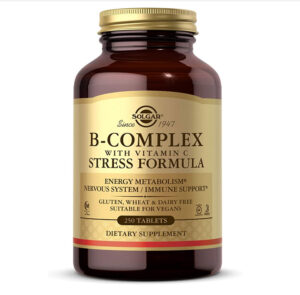

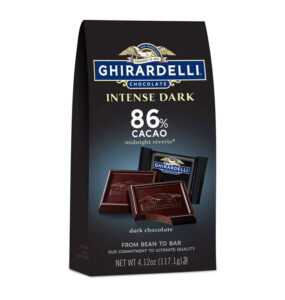
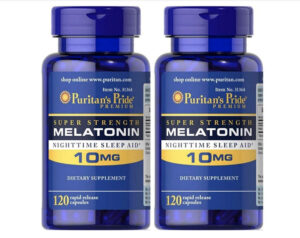
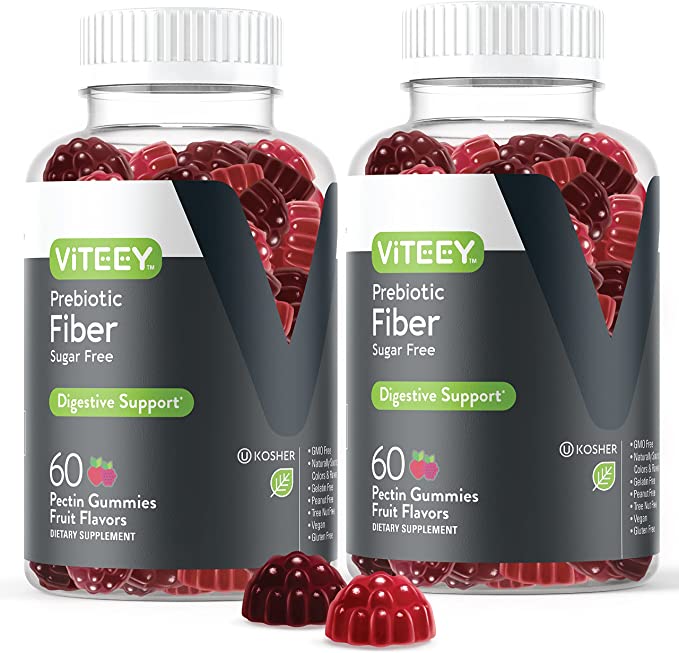

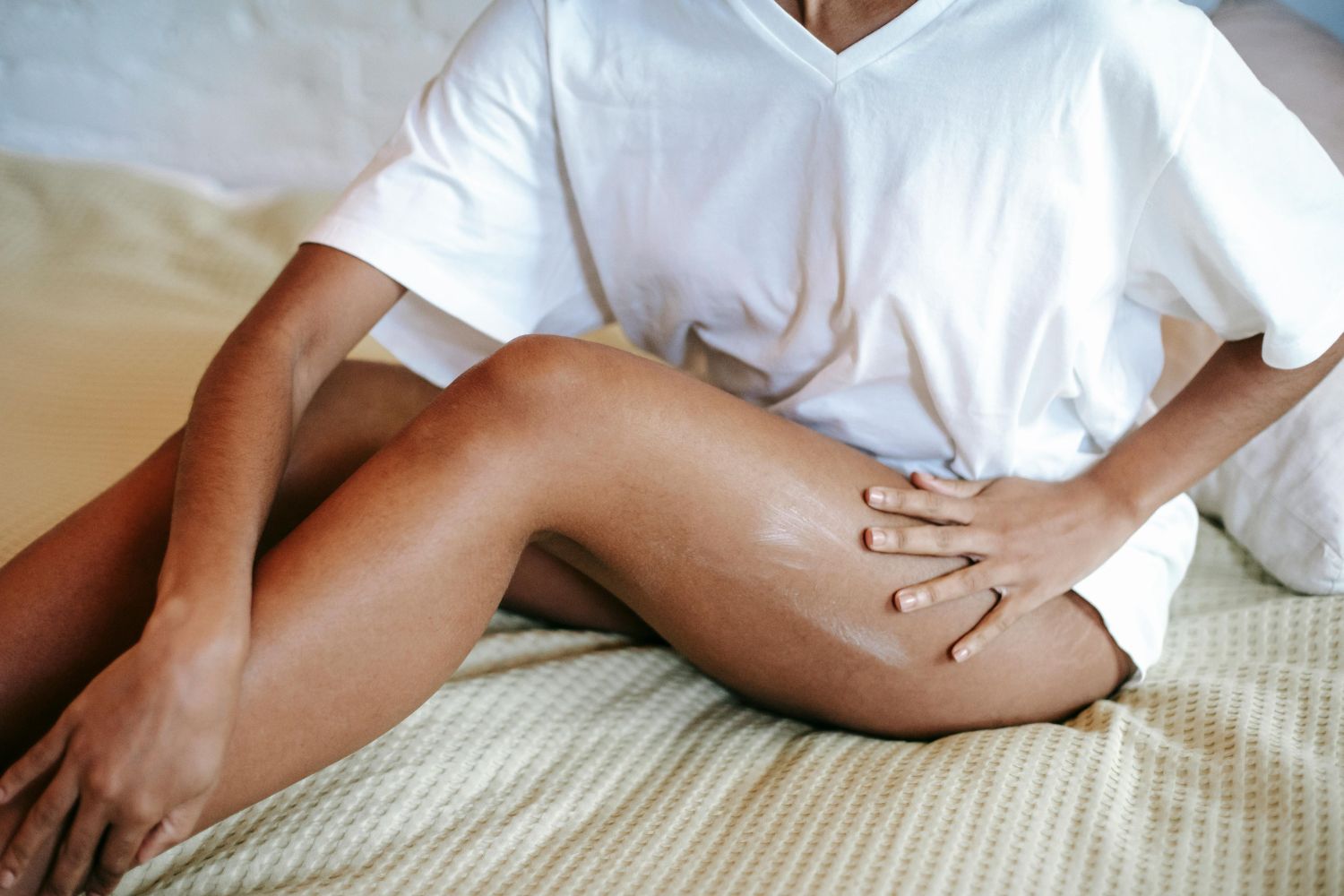


Amber Cummings
Sisu Menoease helped reduce my multiple times a day hot flashes down to one a day or less within the space of a week, which is what it promises, really pleased with it! I also find the yoga with Adriene youtube videos fantastic for stress management.
Amy Cuevas Schroeder
Thanks for the tips, Amber!
Christie Vandyke
Thanks for the info! Gaia Herbs Nighttime Comfort has helped me get relief from the night sweats.
Amy Cuevas Schroeder
Really, Christie? Great tip. I will try Gaia Herbs Nighttime Comfort.
Jayne
How can I find a doctor who supports the HRT regimens described here?
Thank you,
Jayne
Amy Cuevas Schroeder
Jayne, you’ve just asked the golden question. The next step is to find a doctor who specializes in hormonal health and/or menopause. If you live in the U.S., I suggest looking at the North American Menopause Society list of doctors. You can find the link in our Peri List: https://jumbleandflow.com/2020/03/16/peri-list/
Amy Cuevas Schroeder
Jayne, you’ve just asked the golden question. The next step is to find a doctor who specializes in hormonal health and/or menopause. If you live in the U.S., I suggest looking at the North American Menopause Society list of doctors. You can find the link in our Peri List: https://jumbleandflow.com/2020/03/16/peri-list/
Lucia Kanter St Amour
Thank you Amy! Not only will I bookmark this so I can refer to it in the future (I think I’m at the very start of peri at age 51), but I am sharing it with my husband. Already doing dark chocolate (for years!), melatonin (meh on effectiveness for me), vitamins C and D (but I will try that combo you recommend). I also swear by Magnesium Bicarbonate in the evening (you can make it yourself if you have a soda stream machine and just buy milk of magnesia at the grocery store – and consume VERY diluted. Helps with regularity, sleep, and lots of other benefits. Google it 🙂 )